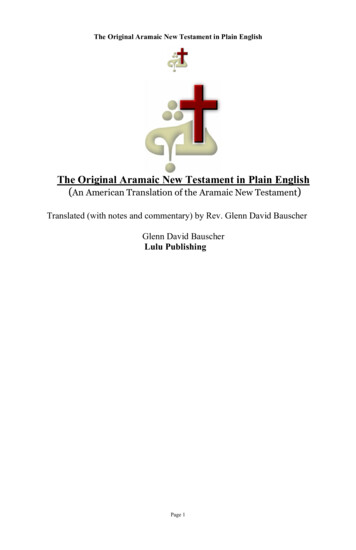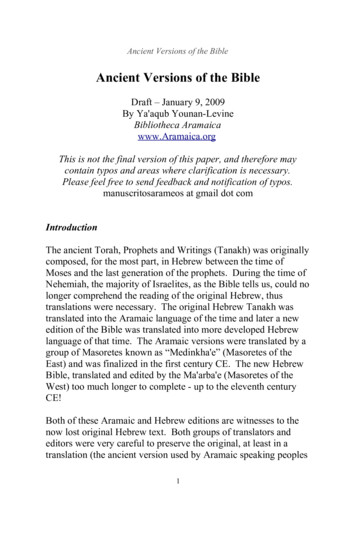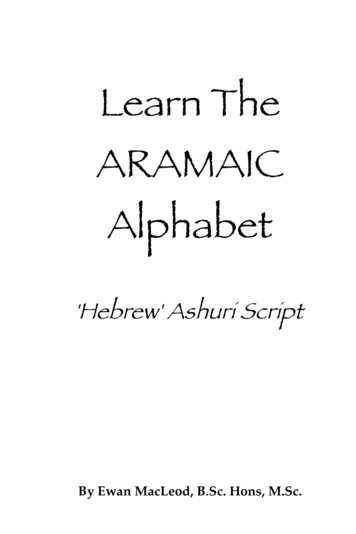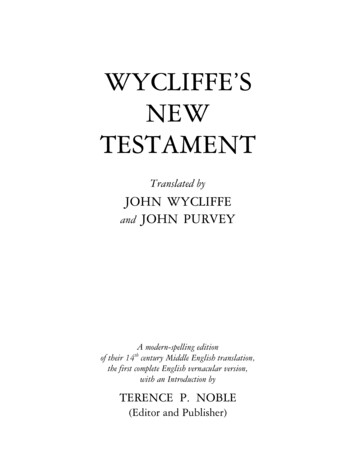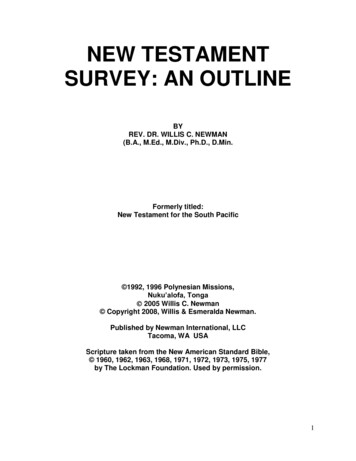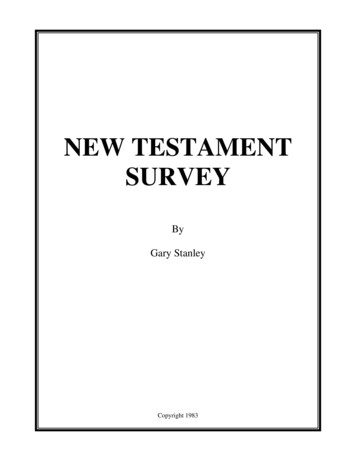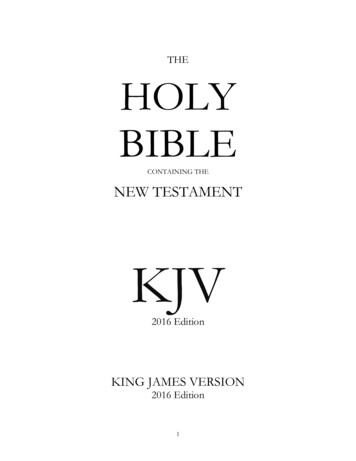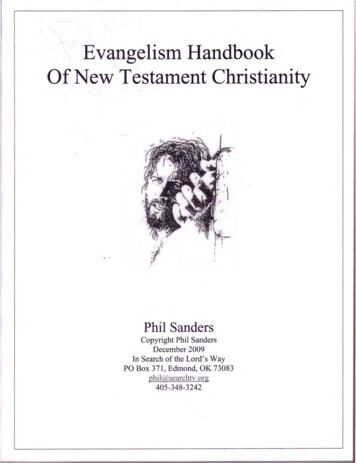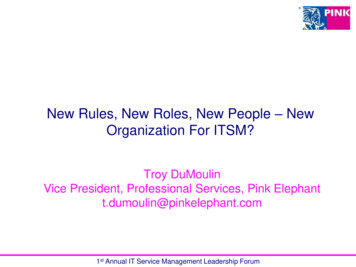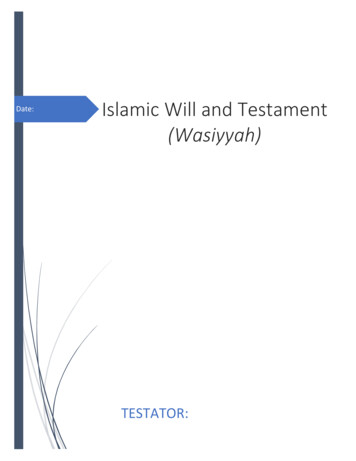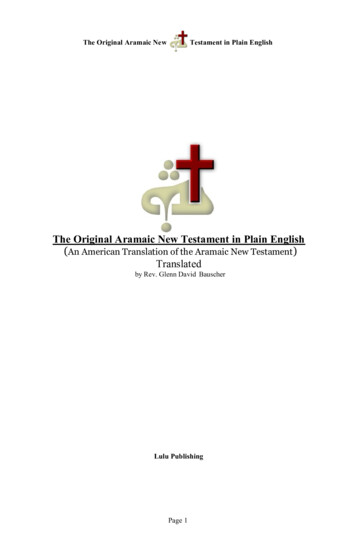
Transcription
The Original Aramaic NewTestament in Plain EnglishThe Original Aramaic New Testament in Plain English(An American Translation of the Aramaic New Testament )Translatedby Rev. Glenn David BauscherLulu PublishingPage 1
The Original Aramaic NewTestament in Plain EnglishCopyright 2007; 7th edition Copyright 2012Glenn David BauscherEditor - Timothy Mitchell, New South Wales, AustraliaAll rights reserved. No part of this book may be reproduced or retransmitted in any mannerwhatsoever, except in the form of a review, without without written permission from thepublisher.Lulu PublishingPage 2
The Original Aramaic NewTestament in Plain EnglishTable of ContentsIntroduction . 4The Gospel According to The Apostle Matthew . 16The Gospel According To Saint Mark . 49The Gospel According To Saint Luke . 70The Gospel according to The Apostle John . 106The Acts of The Apostles . 133The Epistle of The Apostle Paul to the Romans . 168The First Epistle of The Apostle Paul to the Corinthians . 182The Second Epistle of The Apostle Paul to the Corinthians . 196The Epistle of The Apostle Paul to the Galatians . 205The Epistle of The Apostle Paul to the Ephesians . 210The Epistle of The Apostle Paul to the Philippians . 215The Epistle of The Apostle Paul to the Colossians . 219The First Epistle of The Apostle Paul to the Thessalonians . 223The Second Epistle of The Apostle Paul to the Thessalonians . 226The First Epistle of The Apostle Paul to Timothy. 228The Second Epistle of The Apostle Paul to Timothy . 232The Epistle of The Apostle Paul to Titus . 235The Epistle of The Apostle Paul to Philemon . 237The Epistle of The Apostle Paul to the Hebrews . 238The Epistle of The Apostle James . 249The First Epistle of the Apostle Peter . 253The Second Epistle of The Apostle Peter . 257The First Epistle of The Apostle John. 260The Second Epistle of The Apostle John . 264The Third Epistle of The Apostle John. 265The Epistle of The Apostle Jude . 266Introduction to The Revelation of Yeshua The Messiah. 267The Revelation of Yeshua The Messiah . 270Introduction to The Psalms . 286The Book of Psalms . 292Introduction to The Proverbs . 354The Book of Proverbs . 358New Testament Appendix . 382Psalms and Proverbs Appendix. 388Bibliography . 390Page 3
The Original Aramaic NewTestament in Plain EnglishIntroductionThis volume is a translation of what this author believes to be the original Aramaic NewTestament as first written by The Apostles and Evangelists Matthew, Mark, Luke, John, Paul,Peter, James and Jude.This translation of The New Testament is different from most New Testament translations inthat most are translated from Greek or Latin, whereas this is from Aramaic. Aramaic was thelanguage of Jesus of Nazareth (“Yeshua Netsari” in Aramaic) and of his twelve disciples. ThePeshitta New Testament is the only complete Aramaic New Testament known today which isheld by a significant Christian denomination to be the original text written by the Apostles. TheChurch of The East has always held to this text as the original writing of the Apostles,preserved with word for word accuracy by its Scribes for nearly two thousand years withmeticulous care and reverence.This prose translation is taken from the author‟s The Aramaic-English Interlinear Translationof The New Testament (a very literal translation with the Aramaic words side by side with theirEnglish translations in parentheses in the same word order as the Aramaic, which reads right toleft).Why should anyone be interested in such a translation? The answers are manifold and I cannotaddress them all here. The most important reason is that the original Gospels (and Epistles aswell) were written in Aramaic and later translated into Greek for Greek speaking Romans.Josephus addresses the language of the first century Israelites in his 1 st century volumes of Jewishhistory. He wrote in Aramaic and translated his works into Greek later. He also testifies plainlythat Greek was not the language of his Israeli countrymen (born AD 37 and died after AD 100)and that Greek was not spoken by the vast majority of Jews at that time.Josephus provides almost all the historical information of first century Israel available today.Every serious student of the New Testament has consulted Josephus for background informationon that time period in Israel.Here is a statement from Josephus : “I have also taken a great deal of pains to obtain thelearning of the Greeks, and to understand the elements of the Greek language, although I haveso accustomed myself to speak our own tongue , that I cannot pronounce Greek with sufficientexactness. For our nation does not encourage those that learn the language of many nations.On this account, as there have been many who have done their endeavors, with great patience ,to obtain the Greek learning, there have hardly been two or three who have succeeded herein ,who were immediately rewarded for their pains.” – Antiquities XX, XI 2.(published circa A.D.93)Josephus, a learned Priest and Pharisee of his time, wrote that he did not know Greek wellenough to speak it fluently; he knew a few who had learned it well. The main truth to be gleanedhere is that Greek was not the language of Israel, nor a second language. It had to be studieddeliberately to be learned, and it was apparently discouraged by the Jews.In A.D. 77, Josephus wrote his Jewish Wars in Aramaic and later translated it into Greek for theGreek-speaking Roman citizens. Even his later Antiquities, quoted above, shows that Josephuswas not fluent enough in Greek to compose his several volumes in that language. The Jewishrabbis of that time forbade the teaching of pagan tongues to their young men. They taught that itwas preferable to feed one‟s son the flesh of swine than to teach him Greek. Josephus elsewherewrote that he wrote his works “in the language of his country” and later “translated his historyinto Greek”. This establishes that Greek was not the language of Israel.Page 4
The Original Aramaic NewTestament in Plain EnglishThis historical information is valuable in determining what the language of the original NT was.The New Testament was written by Jews in Israel, for the most part, and to Jews originally,since they were the original Christians. Even the church in Rome was established by Jewishconverts who had been dispersed from Israel and spoke Aramaic.Aramaic had been the language of the Holy Land and the Middle East since the 7 th century BC. Itwas imposed on that part of the world by The Assyrians when The Assyrian Empire ruled thatarea of the world in the ninth through seventh centuries BC. Greek never supplanted Aramaic inthat area.Greek did spread in the western empires of Alexander The Great and the Caesars. That is why theHebrew Old Testament was commissioned by Greek King Ptolemy of Egypt around 285 BC tobe translated into Greek, so he and Greek speaking people of Alexandria, Egypt, could read theJewish scriptures in their own language.It makes no sense whatever to suppose the original Gospels were written in Greek. The firstChristian churches were established by Jewish disciples and converts of The Messiah Yeshua(Jesus) in Israel, Samaria , in Asia Minor, Syria and Mesopotamia, and later in the cities ofRome, Corinth, Ephesus, Galatia, Philippi, etc. , all of which were inhabited by colonies of Jewswho had been dispersed there centuries before by the Babylonian, Persian and Greek persecutionsof each respective empire over a period of seven centuries.A careful reading even of the epistles of Paul reveals that he was writing to churchescomprised of Jews familiar with the Old Testament Hebrew writings and laws, and whoseancestors Paul refers to as “our fathers” (See 1 Corinthians 10:1, Romans 2:17-4:25, Galatians2:15) and of Gentiles as well. The Jews took the Aramaic language with them wherever theywent, as it had replaced Hebrew as the language of Israel in the Babylonian captivity in the6th century BC.Aramaic was the lingua franca of the Holy Land, Syria, Mesopotamia, Asia Minor from 700 BCto AD 700. The Jews of first century Israel would have been unable to read Greek gospels (not tomention unable to write them). The order of gospel preaching and writing was always “To theJews first and also to the Gentiles.” Every church would have wanted a copy of the originalreadable by Jews and Gentiles, which would require Aramaic first to the Jews, Syrians,Assyrians, Persians and most Asians, and Greek for most Roman Gentiles.The Greek New Testament testifies that Aramaic was spoken by the Judeans of Christ‟s time.The New International Version uses the word “Aramaic” seven times in the Gospels and Acts toindicate the language of Israel and its inhabitants. Greek is never mentioned as the languagespoken by any of the disciples or any Israelite. The Apostle Paul is referred to as knowing at leastsome Greek in Acts 22:37, but a few verses later he is speaking to the Jews in Aramaic. Paul wasnot from Israel; he was from Tarsus of Cilicia, a center of Greek learning in the Eastern world.Serious study of the above seven references to Aramaic makes clear the fact that the Jews ofIsrael spoke Aramaic as their native language.For an extensive discussion and evidence supporting Aramaic originals, please see my web site:aramaicnt.comI have written three books which bear on the subject: Divine Contact-The Original NTDiscovered , The Aramaic-English Interlinear New Testament and Jegar Sahadutha-“Heap ofWitness”.One question many ask about the Aramaic text is, “Are there major differences in this text ascompared to other translations? The answer is that about 95% of the text is the same as otherPage 5
The Original Aramaic NewTestament in Plain EnglishNew Testaments, but the 5% difference is a really interesting, significant and powerful 5%content!Let me give an example from Mark 14:61-64:61. But he was silent, and he did not answer him anything. And again, The High Priestasked him and said, "Are you The Messiah, The Son of The Blessed One?"62. But Yeshua said to him, "I AM THE LIVING GOD, and you shall behold The Sonof Man sitting at the right hand of Power and coming on the clouds of Heaven."63. But The High Priest ripped his tunic and he said, "Why now do we need witnesses?"64. “Behold, you have heard the blasphemy from his own mouth. How does it appear toyou?” But they all judged that he deserved death.Do you see what I mean? Our Lord used the Aramaic phrase, “Ena Na”, which signifies a Divineutterance in 97% of the places it is found in The Peshitta Old Testament- “I am The LORD yourGod”, “I am The LORD who heals you”, etc, in hundreds of references. Yet Our Lord used thisphrase of Himself about thirty times. Let me give one more example, this one is in John‟sGospel:1. Therefore Yehuda led a troop also from the presence of the Chief Priests and thePharisees. He led the guards and came there with torches and lamps and weapons.2. But Yeshua, because he knew all these things had come upon him, went out and saidto them, "Whom are you seeking?"3. They were saying to him, "Yeshua the Nazarene." Yeshua said to them, "I AM THELIVING GOD." But Yehuda the traitor was also standing with them.4. And when Yeshua said to them, "I AM THE LIVING GOD”, they went backwardand they fell on the ground.Again we find Our Lord used the same phrase, “Ena Na”, and the band of soldiers fell backwardto the ground! This is powerful testimony that Yeshua claimed to be God Himself, when He wasto be arrested and later when put under oath by The High Priest of Israel. It was the testimony ofJesus, quite literally, and when He would have chosen His words precisely and appropriately.The common people may have been ignorant of the significance of this phrase, but Caiaphassurely was not, as He knew the scriptures quite well. John‟s Gospel has 25 instances of Jesusuttering these “I AM” statements: I AM THE LIVING GOD, The Good Shepherd; I AM THELIVING GOD, The Bread of Truth, and “Unless you believe I AM THE LIVING GOD, youshall die in your sins”, etc.As far as the wording, grammar and historical statements in The Peshitta New Testament, Ichallenge anyone to find one error of any kind in the accepted Peshitta text upon which mytranslation is based. If it were actually a translation of Greek, as is commonly supposed byscholars, it represents an error free translation. One cannot say the Greek NT is error free. It hasquite a few Greek grammatical errors in Revelation. The original should be better than thetranslation, not vice versa, especially considering that we are discussing Divinely authoredwritings!Many Greek scholars will take issue with this view of The Peshitta as original, but most of themhave no knowledge of Aramaic and have not read one verse of Aramaic, hence they cannot speakwith authority against The Peshitta‟s primacy or for the Greek NT‟s claim for primacy over ThePeshitta. Greek is taught in most seminaries; Aramaic is hardly taught anywhere. I have studiedand learned Greek and Aramaic well and have read the New Testament in both languages.Beyond this, I have studied the merits and evidence cited for both positions. I believe very fewGreek primacy advocates can honestly make the above claims.Page 6
The Original Aramaic NewTestament in Plain EnglishThere is abundant evidence I have found in The Peshitta via computer which I can honestly say isunprecedented and which is shockingly powerful support for not only the position that ThePeshitta NT is the original, but for something even more dramatic: The Peshitta NT waswritten by God Himself!As I said earlier, I cannot go into the evidence here, but I have done so elsewhere and it is afascinating study. It amounts to an evaluation of the text using the scientific method in anexperiment which produced abundant supporting data. (Please see my website aramaicnt.comfor information.)Apart from the analytical examination of The Greek and Aramaic texts is another and perhapsjust as compelling testimony for an original Aramaic New Testament; that is simply reading thetext itself. I found this extremely moving and powerful. The next best thing to reading theAramaic is reading a good English translation of the Aramaic. This I believe I have provided inthis volume of The New Testament (and in my interlinear New Testament).The word of God is its own best witness. Sinner (pre- Saint) Augustine was converted to Christwhen he heard someone in the street crying out ,“Take and read.” , and he got hold of a Bible andbegan reading The New Testament. He became arguably the most ardent and influentialtheologian - philosopher since The Apostle Paul.So the best advice I can give are those simple words:“Take and read.”A word about proper names is in order. The reader will notice differences in name spellings inthis version from other Greek and Latin based versions. That is because the Greek and Latinlanguages adapt Semitic names of the Hebrew and Aramaic Old and New Testaments intoWestern Greek and Latin forms and these show up in the English translations. Translating fromAramaic directly into English circumvents the middle step and gives a more accuraterepresentation of the actual Hebrew and Aramaic names in English.I have attempted to respect the familiarity of well known NT names such as Mary, Joseph, David,Jacob, Paul, etc, by retaining enough semblance of the familiar spelling to keep themrecognizable and at the same time to give a very accurate rendering of the original name. The onename which represents a blatant exception to that rule is “Yeshua”, which is the original behind“Jesus”.There are other exceptions as well: ”Yohannan” is “John”; “Kaypha” is “Peter”; “Yaqob” is“Jacob” and also “James”. “Yehuda” is “Judah”. “Yoseph” is Joseph. Most others arerecognizable, being similar to the Greek forms.I have also preserved Old Testament names in their familiar forms for the most common names:Moses, Elijah, Isaiah, David, Ruth, Joshua, Solomon, etc. ,as well as OT place names: Jerusalem,Bethlehem, Galilee (Galila) , etc. These were derived from Hebrew, not Greek, and are verysimilar to Aramaic spellings.I have not discarded Greek altogether in determining how to represent proper names, however,especially those not referring to Old Testament persons. The Greek NT is a first centuryproduction and represents, in my view, a window into how the Aramaic names were pronounced.I have consulted Greek transliterations of the many Aramaic names in rendering the Englishspelling of those names, while also giving faithful Aramaic renderings of those names. I alsohave kept the layman reader in mind, trying not to confuse with some completely alien soundingnames that would be totally unrecognizable, especially when the person or place named is afamiliar one to Bible readers (“Pharisees” is “Preesha”; “Sadducees” is “Zaduqia” ; “Jehovah” isPage 7
The Original Aramaic NewTestament in Plain English“MarYah”) , so I have chosen to render those familiar names in the familiar forms, with someexceptions, which I have mentioned in the previous paragraph.Divine Names and titles are generally translated, not transliterated like human names or placenames. “Jehovah” is used to translate the Aramaic “MarYah” , which is The Aramaic for TheHebrew -“Yahweh”, and always refers to The Deity. This Name, very interestingly, is applied toYeshua (Jesus) in the Peshitta New Testament at least 32 times! “MarYah” literally means“LORD JEHOVAH”. It is first applied to the infant Jesus in Luke 2:11. The last reference is inRev. 22.20.Greek has no equivalent for “Yahweh” ; instead it uses “Kurios”, which is not a name, but atitle, and can refer to a human or to God. I cannot believe the original NT would lack the mostsacred Old Covenant Name revealed to man, but the Greek does lack it! This alone disqualifiesthe Greek as the original.The Peshitta NT has “MarYah” (always the Divine Name) 239 times! This the Jews understoodand used as the sacred Name of God in their Aramaic tongue. It always refers to The Deity.I believe what I have in my possession and from which I have translated here (The Aramaic text,not the translation itself) is the exact, word for word, letter for letter, original and Divinelyauthored New Testament! It contains no errors of any kind historical, grammatical,orthographical, textual, geographical, scientific, or theological!It answers to Our Lord‟s promise:Nrben al ylmw Nwrben aeraw ayms -Matthew 24:35“Heaven and earth may pass away, but My words shall not pass away”.rbet aowmn Nm adx atwta wa Nwrben aeraw aymsd Nyd wh qysp- Luke 16:17And it is easier for heaven and earth to pass away, than for one letter to pass from the law.“The Law” is a term referring to the written word of God, as John 10:34 reveals, sinceJesus refers to Psalm 86 as “The Law”.ytp tmykxm hnman hwhy twde spn tbysm hmymt hwhy trwt Psalms 19:7The law of the LORD is perfect, converting the soul: the testimony of the LORD is sure, makingwise the simple.The following is one of eight long messages encoded in The Aramaic New Testament. Eachletter in this 25 letter Hebrew message is separated by exactly 18,474 letters, and spansalmost the entire New Testament!in a manger Yeshua will blossom of God The Son where ? to lodgeowbyab ewsy Uyny la Nb yha NlhlWhere should The Son of God be lodged? Jesus shall blossom forth in a manger.The sense and symmetry in this code is unparalleled among other Bible codes I have seen whichwere found by others. It is poetic and powerful, as are all the codes I have found in The PeshittaPage 8
The Original Aramaic NewTestament in Plain EnglishNew Testament. The imagery used here: Lodging The Son of God in a manger, Jesus buddingforth as a flower in His birth, these are a signature poetic language found in all six of the longcodes I have found and which I display in this book. They possess and convey a beauty rareamong Christian and secular literature. All these codes also center around the Gospel story of TheMessiah‟s birth, suffering, death and resurrection.How could such design and beauty be accidental ? That means there are approx. ten chaptersseparating each letter of the code, which code letters stretch essentially from Matthew toRevelation. There are exactly 18,474 letters between each of the 25 code letters !If one letter of This Aramaic NT were deleted or one letter added to it, this Christmas code aboutThe birth of Christ would not exist!Codefinder, using the frequency statistics for each letter of the code, calculates an R factor of 20,which essentially is the number of decimal places after the decimal point in the probabilityfigure! - 0.0000000000000000001 or, 1 in 100,000,000,000,000,000,000. That is approximately1 in 100 million-trillions.To see more codes in The Peshitta and info. about them, get my book, Divine ContactDiscovery of the Original New Testament at aramaicnt.comPhilosophy of Translation“For the words that you gave me I have given them, and they have received themand known truly that I have proceeded from unity with you.” John 17:8“The words that I speak with you are spirit and life.” John 6:63“Father, hallow them in Your truth, because Your Word is The Truth”. John 17:17But as it is written:"Eye has not seen, ear has not heard, and upon the heart of man hasnot come up that which God has prepared for those who love him. But God has revealed itto us by his Spirit, for The Spirit searches into everything, even the depths of God. And whois the man who knows what is in a man except only the spirit of the man that is in him? Soalso a man does not know what is in God, only The Spirit of God knows. But we have notreceived The Spirit of the world, but The Spirit that is from God, that we may know the giftthat has been given to us from God. But those things we speak are not in the teaching of thewords of the wisdom of men,but in the teaching of The Spirit, and we compare spiritualthings to the spiritual. For a selfish* man does not receive spiritual things, for they aremadness to him, and he is not able to know, for they are known by The Spirit. *(“d‟vanphesh” comes from Napsha –“soul”, “self”, “animal life”, and can mean, “soulish”,“selfish”, “brutish”.) But a spiritual man judges everything and he is not judged by any man.For who has known the mind of THE LORD JEHOVAH that he may teach him? But we dohave the mind of The Messiah.” - 1 Corinthians 2:9-16“Every writing which is written by The Spirit* is profitable for teaching, for correction, fordirection and for a course in righteousness, that the man of God will be perfect andperfected for every good work.” - 2 Timothy 3:16,17Page 9
The Original Aramaic NewTestament in Plain EnglishTranslation is a tricky business. The translator, to be most effective, needs to know the meaning ofthe source he is translating and be able to communicate that in the language of the audience.Translation of scripture is much trickier than translation of the words of man, as a theologicalphilosophical component exists not encountered in secular sources, for what human can know themeaning of the mind of God? It is not simply a matter of knowing two human languages; it is amatter of knowing the infinite mind of Deity and interpreting and conveying it to humans.“And who shall be worthy for these things?”, wrote Paul The Apostle, “For we are not likeothers who blend the words of God, but according to that which is in the truth and accordingto that which is from God, before God in The Messiah we speak”. 2 Corinthians 2:16,17In his second letter to the Corinthians, speaking of ministering the word of God, Paul wrote:“But in this way we have trust in The Messiah toward God, not that we are sufficient tothink anything as from ourselves, but our power is from God, He who made us worthy tobe Ministers of The New Covenant, not in The Scripture, but in The Spirit, for TheScripture kills, but The Spirit gives life.”- 2 Corinthians 3All the above translations are from this translation -The Original Aramaic New Testament inPlain English, by David Bauscher.The Bible is a paradox among all literature. It is a book, or collection of books which says thatmere words cannot convey truth of themselves, only error and death, and that The Spirit of Godalone is Truth and Life. So the Bible is the written word of God which cannot be known by mortalminds. Only God Himself can convey it, and it must also be received by a spiritual mind likeGod‟s mind (Refer back to 1 Cor. 2:16)Effective Bible translation, then, must be primarily the work of The Holy Spirit executed througha human instrument. To some extent, effective translation depends on the inspiration of God asdid the writing of the original scriptures, though not to the same extent, of course.The translation will invariably contain errors, as the target language will not exactly convey themeaning of every original word or phrase. That kind of error is unavoidable and part of theconfusion of languages which God decreed the world at Babel, as recorded in Genesis 11.If the reader or hearer has The Spirit of God within, then The Spirit can bridge the language gap,and what is more important, the mind gap, between God and man.This translation is not perfect, I really don‟t believe there is such a thing as a perfect translation ofThe Bible. I do believe, as did Paul, that “we are not sufficient to think anything as of ourselves,but our power is from God.”I can honestly say that while translating the New Testament, I experienced Divine help, powerand inspiration all the way through. I have a good mind for learning languages, but I was anapprentice watching his Master taking me through the process of using Aramaic vocabulary andgrammar to unveil His Mind and Heart in the English language. I was “along for the ride”, as itturns out. Because of my novice status as an Aramaic scholar, I actually have greater confidencein the results than I might have had if I were a native Aramaean, as George Lamsa was, speakingAramaic fluently. Lamsa did not need to rely on God nearly as much as I did, and frankly, I thinkthe resulting translation shows that to be true. This reveals another paradox.What men call expertise, superior ability and learning, often prove to be a disappointment andlose the contest to the upstart and underdog who had tremendous challenges to overcome and whowent beyond his own capacity and resources to conquer those challenges.Page 10
The Original Aramaic NewTestament in Plain English“The race is not to the swift, nor the battle to the strong.” – Ecclesiastes 9:11The Old Testament teaches this principle very well:“And Saul said to David, You are not able to go against this Philistine to fight with him:for you are but a youth, and he a man of war from his youth.” 1Sa 17:33But we know what happened, though the odds seemed a hundred to one against David, he killedGoliath, for as he said:“The LORD does not save with sword and spear, for the battle is The LORD‟s, and Hewill deliver you into our hands.”The Apostle Paul wrote that scripture is of The Spirit of God and must be understoodwith the aid of The Spirit Who authored scripture. Reading scripture without The Spiritcan kill a person! Interpret that as you will; the point is that we must have The Holy Spirit tospeak to us directly in order to understand scripture and receive spiritual life. This principleapplies to a translator as well as to every reader of scripture.Knowledge of a language can be a hindrance to properly translating scripture. Let me explain. Aperson who speaks Aramaic fluently (which I do not, nor did Murdock or Etheridge) may trust inhis knowledge of the language and may not feel a need to seek God‟s help and trust Him to guidehim in the translation. Thus his knowledge of the language would be a serious impediment andmitigate the spiritual nature and accuracy of the translation. I know that sounds like acontradiction, and I am not arguing that greater knowledge of the language is undesirable, onlythat it can be a stumbling block. It does not need to be, and should not be so.But ask yourself this question: How many translations of The Bible were done by native speakersof Hebrew or Greek? One would think, for example, that the Greek New Testament would bebest translated by Greeks who grew up speaking Greek and also know English. I know of no suchtranslation that is commonly used in the churches. How can this be, that none of the knowntranslations of the Greek N.T. is done by native Greek speakers? I s
The Original Aramaic New Testament in Plain English 1/12/2012 Page 6 New Testaments, but the 5% difference is a really interesting, significant and powerful 5% content! Let me give an example from Mark 14:61-64: 61. But he was silent, and h
